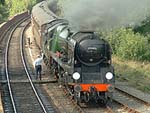| |
3rd
October 1965: This tour, the SCTS "Exeter Flyer", was billed
as the last steam to Exeter. My heart sank when I saw what was up front,
35022 Holland America line. We had a modest load of 8 coaches, 267/290
tons, and we ran to Basingstoke, 47.72
miles in 49 min 36 sec, (44.3 mins net) with local line running from
Farnborough. From Basingstoke we were non stop to Exeter. We had a p.w
slowing at Enham and a signal failure stop at Grateley. Once through
Salisbury, our driver made his intentions known. He was going to take us
over each summit at not less than 70 mph. And so it was 71 mph over Semley, 71 beyond Templecombe, 73 Sutton Bingham, and 71 at Hewish. As
we went down through Axminster I began to wonder whether he was going to
try the impossible. Not 70 over Honiton, no chance. But we were stopped
at Seaton Junction and had to attack the bank from a dead stand. We went
into Honiton Tunnel at 48 mph. So we arrived at Exeter in 119
mins 10 sec from Basingstoke. The net time was 105.0 minutes (70.6 mph).
Top speed was 92 mph at Sherborne, with a 90 mph near Axminster. From
Waterloo, the two net times totalled 149.3 minutes. 2 hours 29 minutes!.
[view log of
35022] |
|
